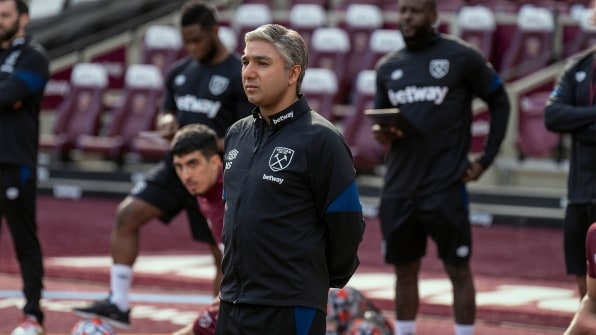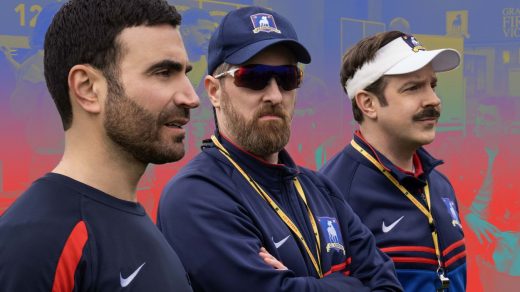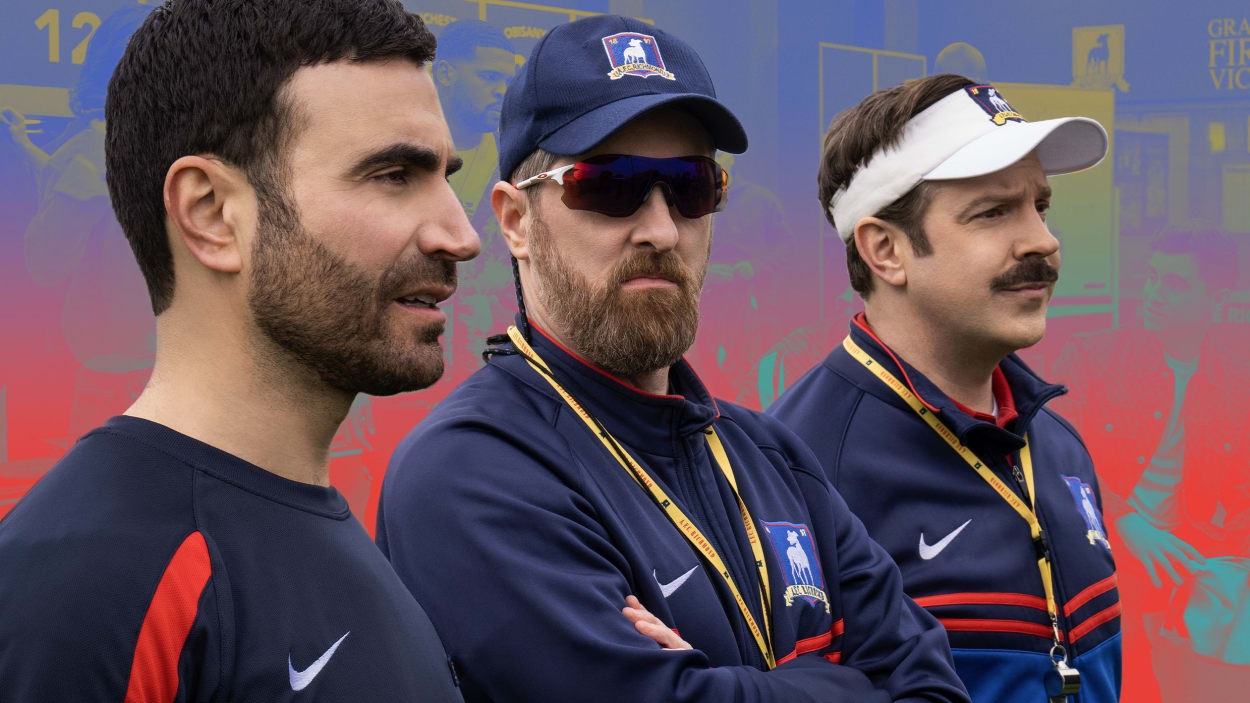‘Ted Lasso’ gets serious in season 3 as a key character takes a dark turn
By Mary Kaye Schilling
The season 3 trailer for the two-time Emmy-winning Ted Lasso, which returns to Apple TV+ on March 15, contains a battle between good and evil. Yes, even a show as folksy as Lasso has a supervillain: Nate Shelley began his journey to the dark side toward the end of season 2, gobsmacking fans of the show with his betrayal of Coach Lasso (cocreator Jason Sudeikis) and his defection to West Ham United, coaching for the detestable Rupert Mannion (Anthony Head). And based on the trailer, Nate and his former boss will face off on the pitch when Lasso’s AFC Richmond plays West Ham United. Forget Marvel: Welcome to the Lasso Universe.
Nate’s turn sharply divided fans of the show, which is the current jewel in Apple TV+’s crown. In addition to winning a 2021 Peabody Award, Ted Lasso, a Warner Bros. Television and Universal TV coproduction, has earned 40 Emmy nominations, and 11 wins, plus high scores on Rotten Tomatoes. (The platform doesn’t share streaming data.) Its price tag has risen accordingly. Less than two months after season 2 debuted—to six times the viewership of season 1—the writers and creators inked lucrative new deals, with Sudeikis alone receiving in the neighborhood of $1 million per episode for season 3.
But what good is a sports show if it doesn’t keep viewers yelling from the stands? For some, Nate’s betrayal provided an unexpected (but welcome) edge to an unwaveringly feel-good show; Coach Lasso, they argued, deserved Nate’s anger—he’d been emotionally absent all season. Others, however, took to social media with fury, their knickers seriously in a twist.
Roy Kent would happily tell stroppy fans to fuck off. But Brett Goldstein is made of softer stuff; the executive producer, a two-time Emmy-winner for his portrayal of Kent, was shocked by their ire. “As writers, we analyzed and discussed Nate’s psychology, his upbringing, his past,” he says. “We love Nate, and I can’t think of him as a villain. It was heartbreaking and sad. It’s amazing how many people were, like, ‘I could fucking kill that guy.’”
If you’re looking to create a supervillain origin story, you could do worse than start with an abusive father (see Spider-Man’s ultimate nemesis Green Goblin). And Nate’s vituperative dad certainly fits the bill. It’s why Nate blossomed under the goofy, benevolent Lasso, who recognized a strategic genius in Richmond’s shy, bullied kit man. He gives “Nate the Great” the respect he’s craved, and a power he’s never had. At the end of season 1, Lasso promotes him to assistant coach.

Nate, as played by Nick Mohammed, quickly became a fan favorite, which might explain the backlash. But as abrupt as his anger felt to some, the writers had laid the groundwork: confidence turned into arrogance, the bullied became the bully. Even Nate’s hair transformed, from dark brown to the slicked back shock-white of movie villains.
Brendan Hunt, much like his character Coach Beard, took a philosophical view of fan resentment. “I tried not to worry too much about it at the time,” says Hunt, Ted Lasso cocreator. “The intensity with which people react when a show comes out once a week is not necessarily the same as when people binge it. Having to wait for the next episode really amplifies the emotions you’re feeling. But that kind of reaction also means people care, so we’ll take it.”
Goldstein says the Lasso creators are familiar with working in a vacuum, ignoring both criticism and accolades. After all, they wrote a defiantly positive show at a time when TV was trending dark, and watched it get rejected by everyone in Hollywood until Apple TV+ picked it up. When the series became a massive hit—“which was lovely and a relief,” says Goldstein—the challenge was “not to get swayed by all that wonderful and distracting noise.” The result was a second season that featured mental illness and a beloved character going rogue.
“The writers definitely talked about Nate going into season 3,” says Goldstein. “We were like, Wow! Oh, boy. It’s not what we expected. But ultimately we had to continue telling the story we were telling, even if we suspected [viewers] wouldn’t like it.”
Goldstein admits that his concern for Nate had a lot to do with protecting Mohammed, a relative unknown at the time: “He’s the sweetest guy in the world.” But Hunt isn’t worried about Mohammed, no matter Nate’s fate in season 3. “With all the projects Nick has going”—including costarring with Tina Fey and John Hamm in the upcoming feature comedy Maggie More(s)—”he’ll be winning the world back over.”
(11)



